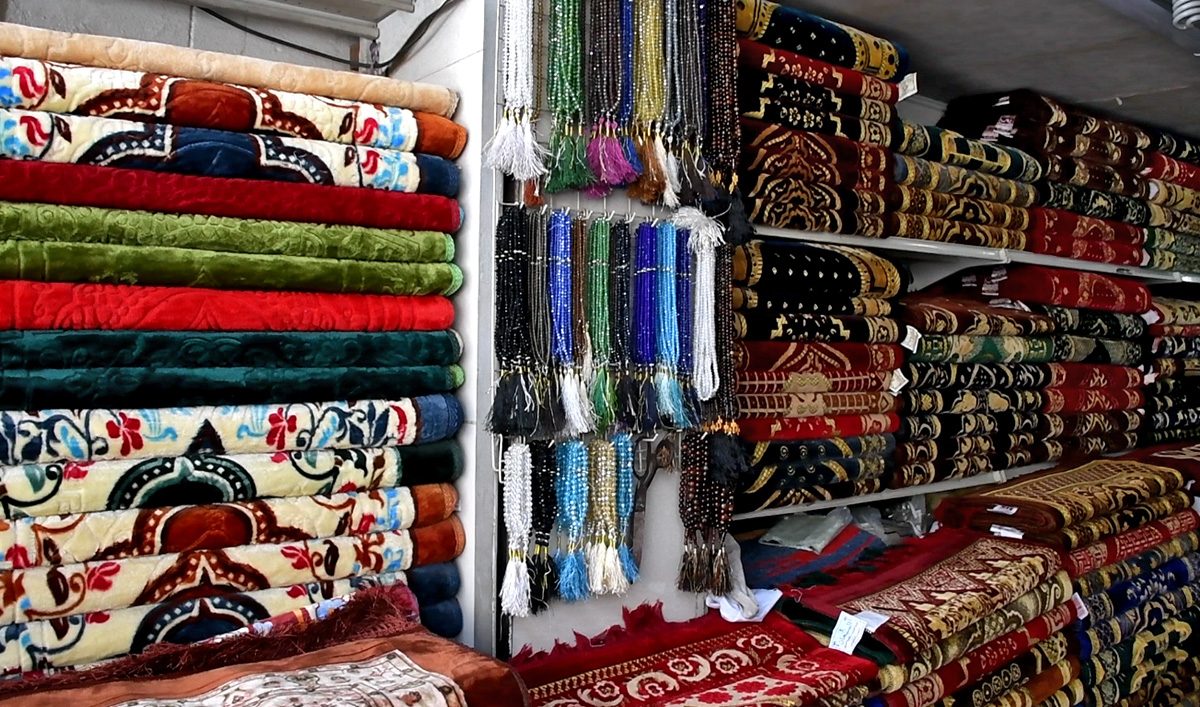KARACHI: Every year, hundreds of Pakistanis visit Shaikh Rafi’s shop on Karachi’s busy MA Jinnah Road to buy prayer mats and ihram robes ahead of the annual Hajj pilgrimage to Makkah.
But not this year.
Since Saudi Arabia announced last month that the 2020 Hajj would welcome a “very limited” number of pilgrims in order to prevent the spread of the coronavirus, Rafi spends his days dusting off unsold goods and waiting anxiously for customers who never arrive.
“This is our routine since the last couple of months,” said Rafi, who sells prayer mats and ihram robes worn by Muslim pilgrims at his shop in Karachi’s Allahwala Market.

Muslim prayer mats and beads on display at a shop in Karachi, Pakistan on July 20, 2020. (AN photo)
The plans of around 2.5 million Muslims globally, almost 180,000 from Pakistan, were upended when Saudi Arabia restricted this year’s Hajj, ravaging Pakistan’s 160 billion rupee ($1 billion) Hajj industry.
Rafi’s is only one of at least 5,000 small businesses effected in the megacity of Karachi.
“Since the decision of the Kingdom to suspend Umrah flights and limit the Hajj, almost all related businesses are experiencing worst sales,” Rafi said. “We open shops expecting that someone might come but the day ends with no customers.”
“In normal circumstances people used to buy prayer rugs and caps, before or after performing Hajj or Umrah, as a gift for their relatives and friends but since the lockdown the industry is completely shutdown,” said Muhammad Rizwan, a wholesaler of rugs and caps.
Traders say businesses are not only suffering from lack of sales but also pending payments.
“There is no business for around the last five months and our payments have been stuck up with retailers and shop owners who buy on credit,” a wholesale supplier of ihram, Muhammad Hanif Katlia, told Arab News. “Many shop keepers have defaulted and have not paid rents while many have fled without paying dues.”
"I urge government to open #Umrah, shrines and mosques for all people to pray for the riddance from #CoronavirusPandemic," a retailer in Karachi said as his business was affected by restrictions on #Hajj this year. || #Pakistan
–
Full story by @Khurshid72: https://t.co/WAvWTyDAo3 pic.twitter.com/NtY2NC3IGg— Arab News Pakistan (@arabnewspk) July 23, 2020
Some production units in the Hajj and Umrah industry have shut down completely, costing jobs, traders said, while many businesses have moved to manufacturing other items.
“The production has stopped for the last five months and we have laid off laborers,” said Jannat Gul, a manufacturer of ihram and other Hajj Items. “There is no buying and selling nor borrowers are paying back dues since the Umrah was suspended due to coronavirus.”
This year will be the first in modern times that pilgrims from abroad will not be allowed into Makkah
According to Pakistan’s Ministry of Religious Affairs and Interfaith Harmony, which oversees Hajj arrangements, 179,210 Pakistanis had already registered to attend this year: 71,684 through private tour operators and 107,526 through cheaper, government-supported packages.












